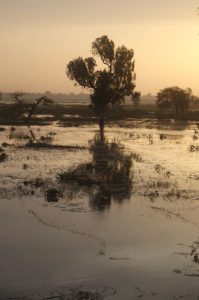 The real expedition has started, we are off!
The real expedition has started, we are off!
We have left. For real. This morning a wakeup call at 5 am, breakfast, packing the truck, and off we go at 6 am sharp. The plan, suitably vague, for the next few days – two, or maybe three, equally vague – is to visit some villages in the south of Chad, including nomads, and including some local ceremonies.
But first, we have some significant driving to do. On an initially very poor road. But the good news is that outside Ndjamena we can take pictures again. And the countryside is entertaining enough, villages passing by, with what I think are several family compounds, each with a number of round huts, covered with thatched roofs – there is hardly any corrugated iron here, very unusual in this age of progress. Would the people realise that thatched roofs are actually much cooler than tin sheets? Occasionally there is market, more often the market area is empty, I suppose markets are only every five or six days. Also outside the city, a large refugee camp, Chad gets lots of refugees from Sudan and from CAR, but also from Boko Haram-threatened areas in Cameroon and Nigeria.
Economic activity along the road is mostly animal husbandry, whether cattle or goats or camels. There is not much that grows here, although closer to the river, some small rice paddies are being cultivated. I am being told that in the wet season much of this land is actually under water. Hard to believe, if you see how dry it is now. This is largely Muslim area, and many of the villages have a small, very charming mosque – not easy to photograph from the moving bus, but I did manage a few.
We stop for cappuccino and apple pie with cream…, just kidding, we have water melon and pineapple along the road, there is a woeful lack of tourist infrastructure here, no restaurants, no fancy fuel service stations. The bush is our toilet. By now, all the water we are carrying has become warm, almost undrinkable so, because outside it is hot. Very hot. You know the feeling of a hairdryer in your face? That’s what it feels if you come close to the open window. Maybe I have to elaborate a little on the truck. The cargo space has been transferred into something closer to a bus, with sliding windows, a door with metal stairs, a table in the middle on three sides surrounded by a total of seventeen chairs, fairly comfortable touring car-type. We are thirteen in the group, fourteen including Alonso, our tour organiser and driver. For the rest the outfit is pretty basic. No air conditioner, of course, that’s the hairdryer feeling. Most important asset: a charger, for 220V, with enough power to charge an army of mobile phones and cameras. No exploration anno 2023 could go without.
Another three hours later – it is now close to three – we reach Bongor, where we meet up with the local NGO that is our host for the next few days. It is a Chadian organisation with local contacts, and amongst other things a cultural promotion program. We leave the truck behind, transfer into four 4×4 vehicles, and continue our way to Gongawa. By the time we arrive here, it is already dark – we have been twelve hours on the road. Gongawa is the central town in the Moussay area, the tribe that is going to hold the dancing and ceremonies. We meet the chief chief (we will meet other, local chiefs later), who welcomes us – I said earlier that the people look healthy, not obese, but this doesn’t count for the chiefs, or heads of police, or other important office bearers, they are all, without exception, rather large and heavy. Must be the lifestyle.
Before we continue, we also have to pick up a permit from the police, so we all, four cars in convoy, drive off to what looks like a mosque, or a building attached to the mosque. Here are assembled a whole range of other important people, in a large airconditioned (air conditioner!!!, after a whole day in the heat). Unfortunately, we receive the permit in 30 seconds, so we can leave again. Leave the AC behind. But more importantly, leave the formalities behind.
Or so we thought. Apparently the permit was not OK, or was, but someone checking didn’t think so, long story short, we had to return to the place we had just left. Luckily, just one car had to, so we in the rest of the convoy found a local bar, where I had probably the best beer ever, or at least it tasted so. Another hour, and a lot of confusion, later, we finally continued to our final destination, Djodo Gasa. Where we arrived close to ten at night. To set up the tents in the dark – we are camping, the next few days. Not exactly an upgrade after the rather spartan Catholic Mission.
Did we voluntarily sign up for this?
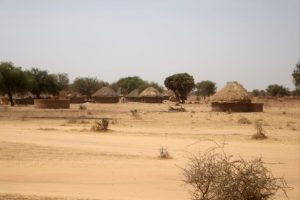
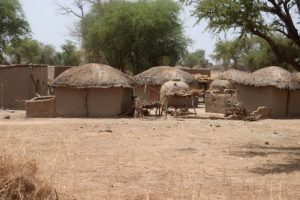

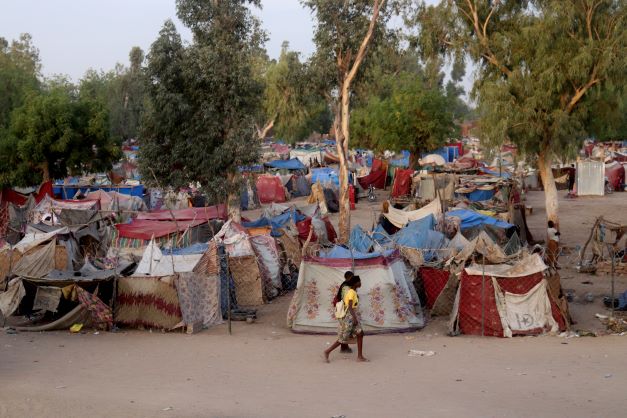
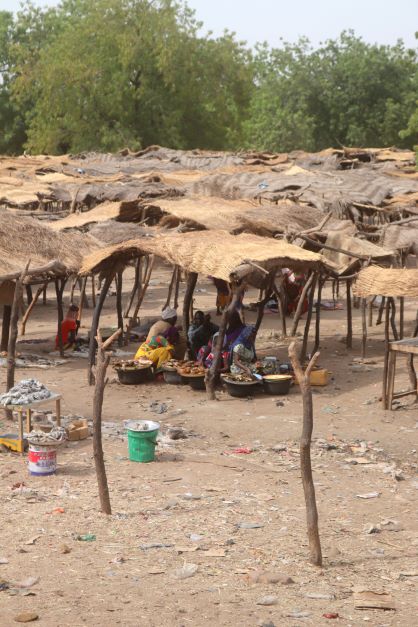
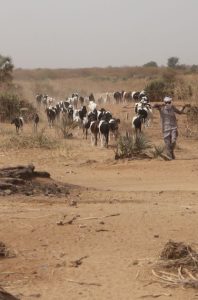

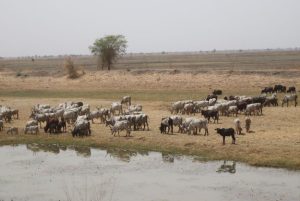
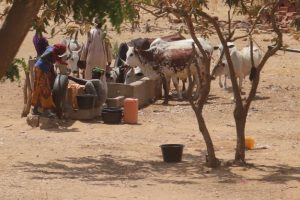
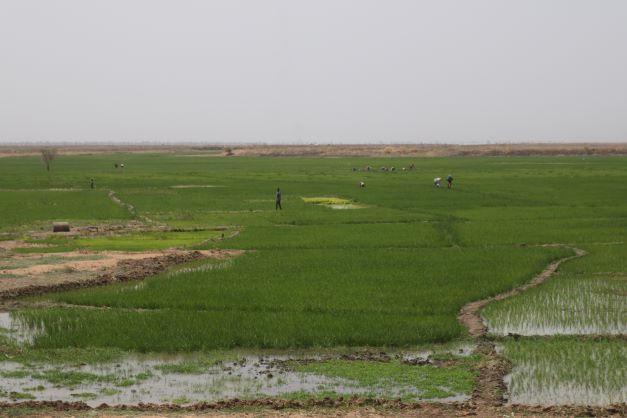
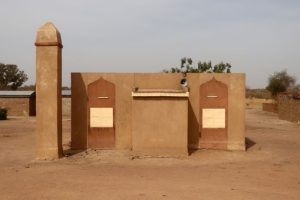
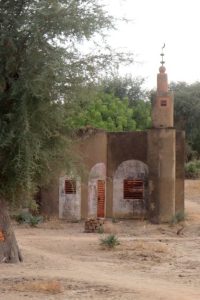
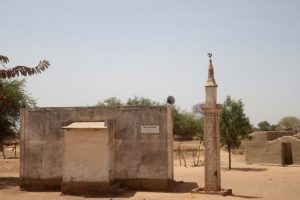
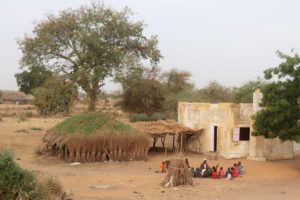


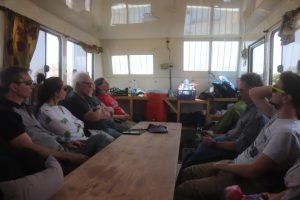

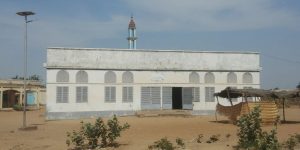
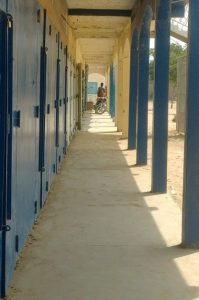
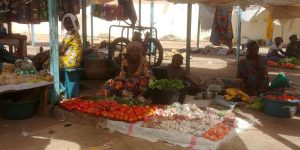
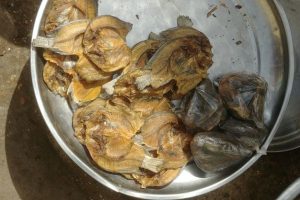


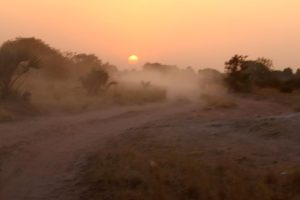

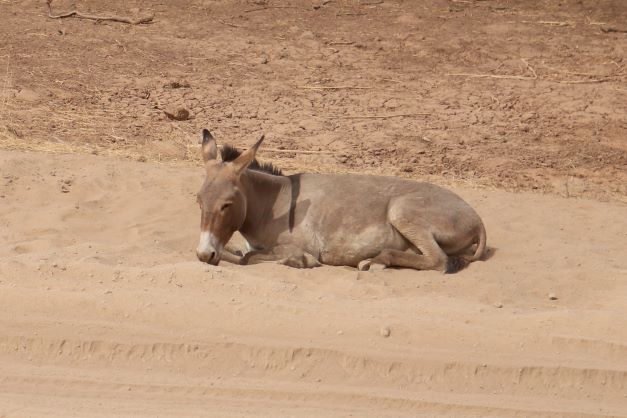










You must have known this expedition isn’t very luxurious ?but it’s a great challenge! Enjoy